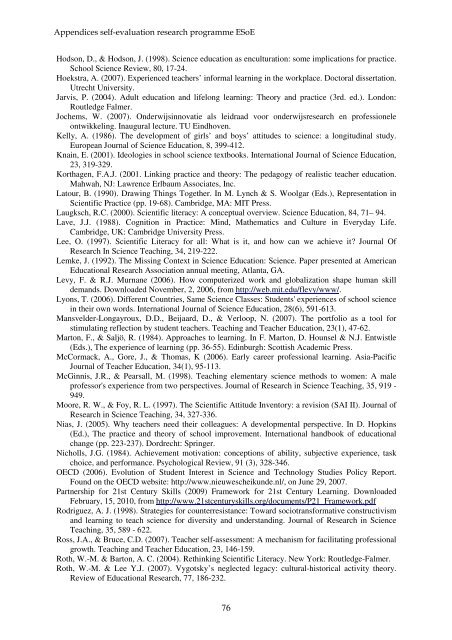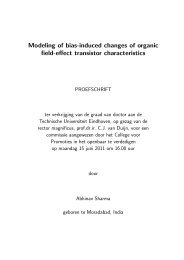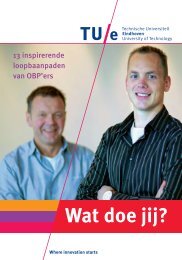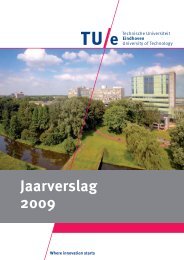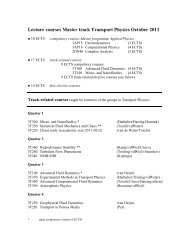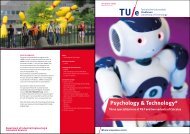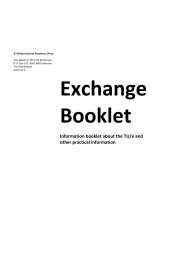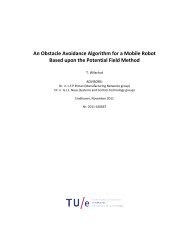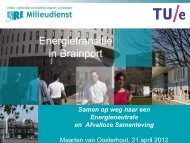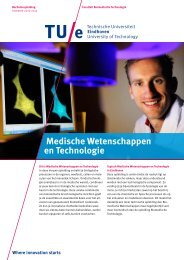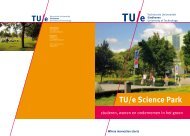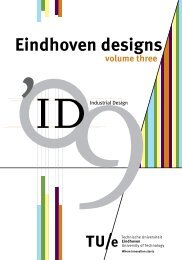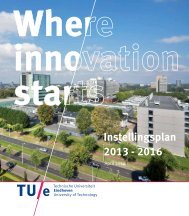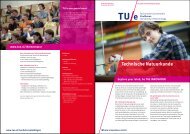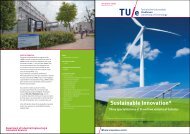Self-evaluation - Technische Universiteit Eindhoven
Self-evaluation - Technische Universiteit Eindhoven
Self-evaluation - Technische Universiteit Eindhoven
Create successful ePaper yourself
Turn your PDF publications into a flip-book with our unique Google optimized e-Paper software.
Appendices self-<strong>evaluation</strong> research programme ESoE<br />
Hodson, D., & Hodson, J. (1998). Science education as enculturation: some implications for practice.<br />
School Science Review, 80, 17-24.<br />
Hoekstra, A. (2007). Experienced teachers’ informal learning in the workplace. Doctoral dissertation.<br />
Utrecht University.<br />
Jarvis, P. (2004). Adult education and lifelong learning: Theory and practice (3rd. ed.). London:<br />
Routledge Falmer.<br />
Jochems, W. (2007). Onderwijsinnovatie als leidraad voor onderwijsresearch en professionele<br />
ontwikkeling. Inaugural lecture. TU <strong>Eindhoven</strong>.<br />
Kelly, A. (1986). The development of girls’ and boys’ attitudes to science: a longitudinal study.<br />
European Journal of Science Education, 8, 399-412.<br />
Knain, E. (2001). Ideologies in school science textbooks. International Journal of Science Education,<br />
23, 319-329.<br />
Korthagen, F.A.J. (2001. Linking practice and theory: The pedagogy of realistic teacher education.<br />
Mahwah, NJ: Lawrence Erlbaum Associates, Inc.<br />
Latour, B. (1990). Drawing Things Together. In M. Lynch & S. Woolgar (Eds.), Representation in<br />
Scientific Practice (pp. 19-68). Cambridge, MA: MIT Press.<br />
Laugksch, R.C. (2000). Scientific literacy: A conceptual overview. Science Education, 84, 71– 94.<br />
Lave, J.J. (1988). Cognition in Practice: Mind, Mathematics and Culture in Everyday Life.<br />
Cambridge, UK: Cambridge University Press.<br />
Lee, O. (1997). Scientific Literacy for all: What is it, and how can we achieve it? Journal Of<br />
Research In Science Teaching, 34, 219-222.<br />
Lemke, J. (1992). The Missing Context in Science Education: Science. Paper presented at American<br />
Educational Research Association annual meeting, Atlanta, GA.<br />
Levy, F. & R.J. Murnane (2006). How computerized work and globalization shape human skill<br />
demands. Downloaded November, 2, 2006, from http://web.mit.edu/flevy/www/.<br />
Lyons, T. (2006). Different Countries, Same Science Classes: Students' experiences of school science<br />
in their own words. International Journal of Science Education, 28(6), 591-613.<br />
Mansvelder-Longayroux, D.D., Beijaard, D., & Verloop, N. (2007). The portfolio as a tool for<br />
stimulating reflection by student teachers. Teaching and Teacher Education, 23(1), 47-62.<br />
Marton, F., & Saljö, R. (1984). Approaches to learning. In F. Marton, D. Hounsel & N.J. Entwistle<br />
(Eds.), The experience of learning (pp. 36-55). Edinburgh: Scottish Academic Press.<br />
McCormack, A., Gore, J., & Thomas, K (2006). Early career professional learning. Asia-Pacific<br />
Journal of Teacher Education, 34(1), 95-113.<br />
McGinnis, J.R., & Pearsall, M. (1998). Teaching elementary science methods to women: A male<br />
professor's experience from two perspectives. Journal of Research in Science Teaching, 35, 919 -<br />
949.<br />
Moore, R. W., & Foy, R. L. (1997). The Scientific Attitude Inventory: a revision (SAI II). Journal of<br />
Research in Science Teaching, 34, 327-336.<br />
Nias, J. (2005). Why teachers need their colleagues: A developmental perspective. In D. Hopkins<br />
(Ed.), The practice and theory of school improvement. International handbook of educational<br />
change (pp. 223-237). Dordrecht: Springer.<br />
Nicholls, J.G. (1984). Achievement motivation: conceptions of ability, subjective experience, task<br />
choice, and performance. Psychological Review, 91 (3), 328-346.<br />
OECD (2006). Evolution of Student Interest in Science and Technology Studies Policy Report.<br />
Found on the OECD website: http://www.nieuwescheikunde.nl/, on June 29, 2007.<br />
Partnership for 21st Century Skills (2009) Framework for 21st Century Learning. Downloaded<br />
February, 15, 2010, from http://www.21stcenturyskills.org/documents/P21_Framework.pdf<br />
Rodriguez, A. J. (1998). Strategies for counterresistance: Toward sociotransformative constructivism<br />
and learning to teach science for diversity and understanding. Journal of Research in Science<br />
Teaching, 35, 589 - 622.<br />
Ross, J.A., & Bruce, C.D. (2007). Teacher self-assessment: A mechanism for facilitating professional<br />
growth. Teaching and Teacher Education, 23, 146-159.<br />
Roth, W.-M. & Barton, A. C. (2004). Rethinking Scientific Literacy. New York: Routledge-Falmer.<br />
Roth, W.-M. & Lee Y.J. (2007). Vygotsky’s neglected legacy: cultural-historical activity theory.<br />
Review of Educational Research, 77, 186-232.<br />
76


